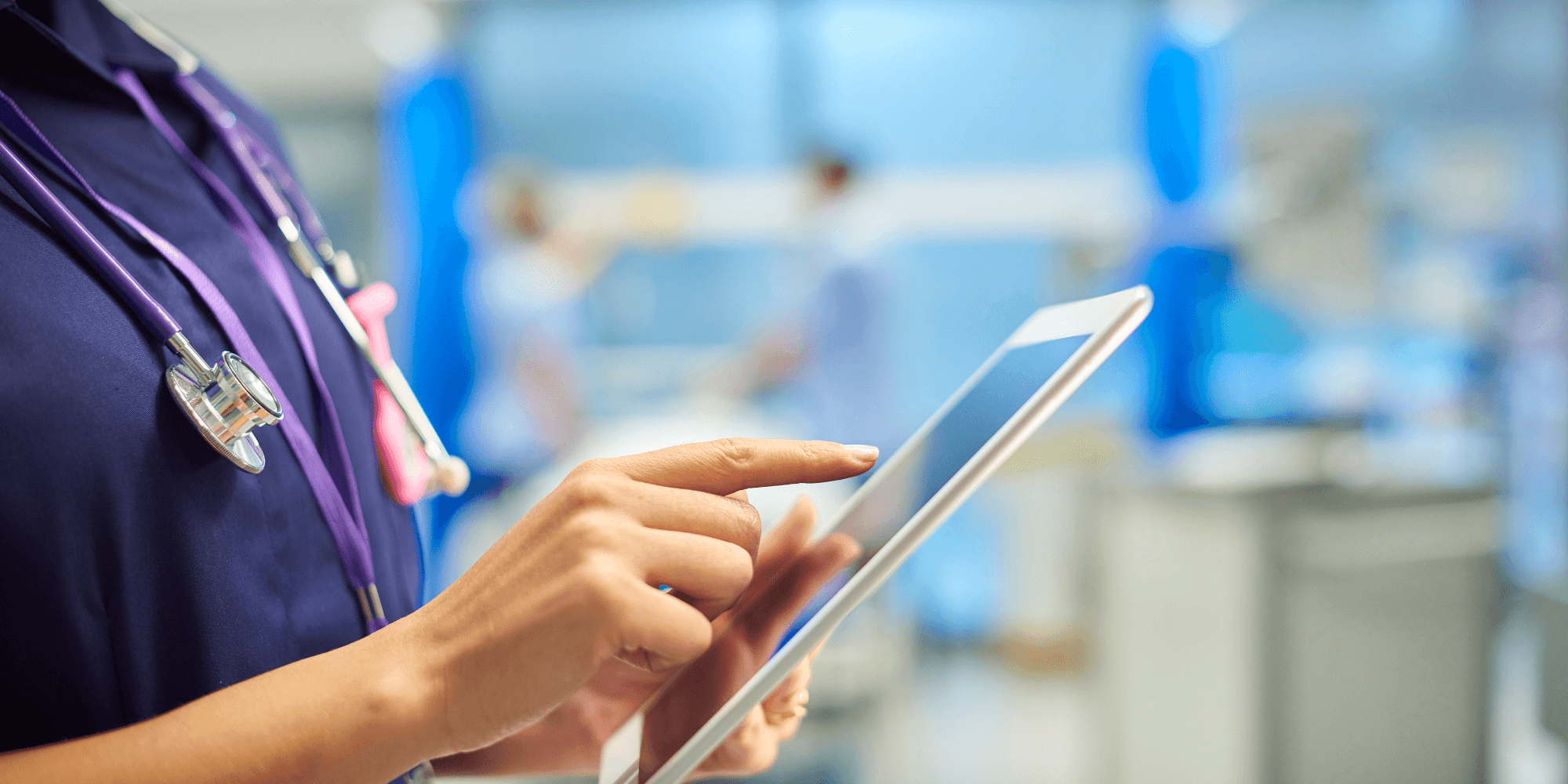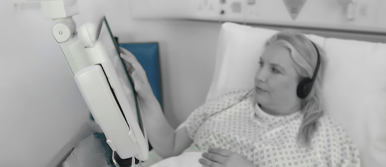4 Ways to Help the NHS Through Healthcare Apps
7 minute read | 13/04/2023

Our free healthcare service has always been a source of pride for the UK. This was made even more apparent during the Covid-19 pandemic. However, with the NHS facing numerous challenges, how can we bring about positive change? The solution lies in technology.
These are the areas in which digital technology can positively impact the NHS.
-
Better access to healthcare services
-
Improved efficiency
-
Improved patient engagement
-
Reduced cost
How can Technology Solve NHS Problems?
To tackle the challenges faced by the NHS, we need to focus on integrating healthcare apps under one system. While there are numerous standalone apps available, such as My Care by EPIC or Patient Access, they require patients to download and actively use them on their personal devices. However, implementing this system may exacerbate technology inequality for older generations who may not have access to modern technology such as smartphones.
By consolidating these apps into one system, patients can easily access healthcare services, e-prescribing services, and virtual consultations, among other features, without the need for multiple downloads and updates. This integrated approach can improve efficiency, patient engagement, and reduce costs, ultimately enhancing the quality of care provided by the NHS.
Imagine having all the healthcare apps you need in one place, including patient meal ordering, wellness apps, clinical messaging, medication advice, and more. By consolidating these apps into one integrated system, patients can easily take control of their own care and improve their overall experience and staff can have specialist services at their fingertips. This approach will empower patients and improve the efficiency, engagement, and cost-effectiveness of healthcare services.
How is all of this achievable? Through SPARK® Horizon.
Our Director of Business Development, James Morriss, is particularly passionate about the capabilities of apps and the benefits they can bring to the NHS. He is very honest about the situation and knows this isn’t a change we can bring on our own.
‘We want to appeal to technology providers that already exist within the NHS, organisations that struggle to get their apps in front of the right patients at the right time and help them increase app exposure, drive usage, and assist the NHS with many of the pain points that exist today.’
Challenges that we face include:
- How a Trust can make use of an app safely
- How an app provider could reach patients
- Promote the app
- Distribute it
- Support it.
Inequality of access is another significant challenge, as there is an acute lack of devices on wards to access some of the incredible tools that the NHS has already procured.
SPARK TSL is actively working with lots of Trusts to look at the infrastructure that's already in place to encourage the re-purposing of old technology and help the NHS reduce costs where possible.
How can we Improve the Patient Experience Through Healthcare Apps?
We’ve established that technology is the future of the NHS and has the capability to make positive changes. But how? Let’s break it down into the topics first listed.
- Access to healthcare services
Healthcare apps can provide patients with easier access to NHS healthcare services, allowing them to book appointments, receive virtual consultations, and access their medical records. This is all possible at the bedside with the installation of SPARK® Horizon. Patients can be introduced to these systems in hospital then be more likely to continue using them at home to streamline patient care. This will also mean patients are more empowered to manage their health and be more informed about their care.
- Improved efficiency
By automating certain processes and reducing administrative work, healthcare apps can improve the efficiency of NHS services and staff. This can help reduce the workload for healthcare professionals, allowing them to focus on delivering high-quality care to patients. Simple information about the hospital such as meal time and hospital maps can also be available on bedside devices. This will save staff time answering simple common questions and focus their energy on where it matters most.
- Improved patient engagement
If information is readily available for patients and is easy to access, they are more likely to engage with these resources. Convenience is becoming more of an important factor in our daily lives. By having all the necessary apps on a bedside device, patients will be more engaged with what’s on there. This also includes entertainment apps to relieve boredom when patients are recovering or waiting.
- Reduced costs
All of the above can help reduce costs. Whether this is saving staff time through automated tasks or digital consultations directly to the bedside. Or reducing re-admission rates by informing the patient of their care and providing information at their fingertips. Known cost savings such as digital meal ordering and E-prescribing also help contribute to reducing costs as a whole.
Why Integrated Healthcare Apps are Essential
The NHS has been struggling with a number of issues highlighted above. If nothing is done then the situation could get worse . That’s why employees of the NHS attend healthcare events focused on technology and the improvements it can bring to their Trust, such as The HETT Show. The push toward digital transformation has never been more apparent and it needs to happen at a faster rate to produce actionable benefits.
apparent and it needs to happen at a faster rate to produce actionable benefits.
The NHS has been slow to adopt new digital technologies, which has resulted in inefficiencies and missed opportunities for improving patient care. While progress has been made in recent years, there is still much work to be done.
The NHS is structured around separate providers of primary, secondary, and social care, which can lead to fragmentation and inefficiencies in care delivery. There is a growing recognition of the need to integrate these services more effectively, particularly for people with complex health and social care needs.
NHS issues are complex and interrelated and will require significant investment and effort to address. However, by working collaboratively with stakeholders across the health and social care system, the NHS can overcome these challenges and continue to deliver high-quality care to patients across the UK.
Conclusion
The NHS needs to utilise the benefits that existing apps can bring to increase staff efficiencies, save time, save money, and most importantly, improve the patient experience. SPARK TSL can help the NHS achieve this through partnership and collaboration.
We already have successful relationships with NHS partners with our WiFi platform, SPARK® Connect and our BYOD entertainment and engagement platform, SPARK® Media. Read our case studies to see for yourself.
We intend to create even more positive change with SPARK® Horizon and our apps catalogue.

About the author
Rebecca O'Donovan
Becky is the Marketing Director at SPARK TSL, of whom she has worked for since 2012. She is responsible for high-level marketing strategy focusing on lead generation and aiding the vision of the business to ensure business growth.
More articles by the author
Related articles
 Healthcare Industry
Healthcare Industry
Implementing Change in Healthcare: Our Top Tips for Success
The healthcare industry can be sprawling and complicated which makes implementing change difficult. Processes ...
 Healthcare Industry
Healthcare Industry
Improve Workforce Efficiencies in Healthcare to Enhance Patient Care
There’s no doubt the current pandemic overwhelmed health systems and exposed limitations in delivering care. ...
 The SPARK Solution
The SPARK Solution
NHS Patients Shouldn’t Pay for Hospital Entertainment
Why Do Patients Have to Pay for Entertainment? To properly answer this question, we need to go back in time. ...


